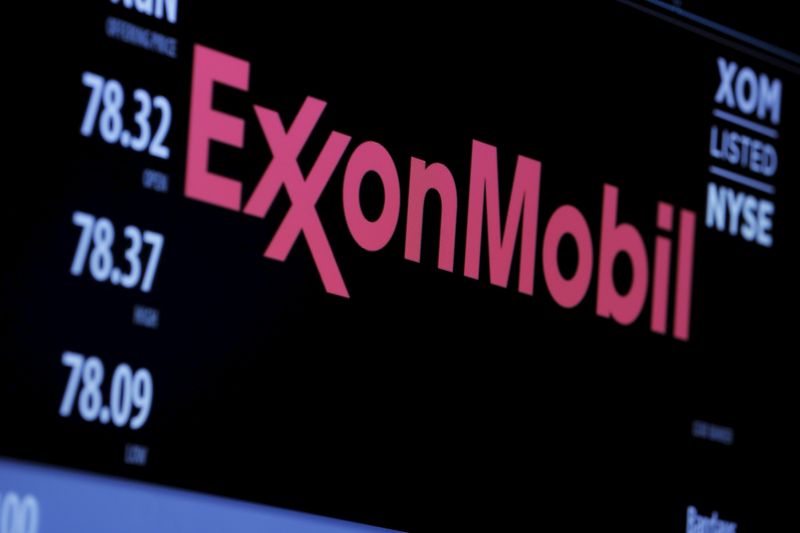By Sabrina Valle
HOUSTON (Reuters) -Exxon Mobil's (N:XOM) second-quarter profit dropped 56% and fell short of Wall Street expectations, the company said on Friday, joining rivals hurt by the sharp decline in energy prices and lower fuel margins.
Profits for global oil majors have dropped by about half from a bumper 2022, when Russia's invasion of Ukraine sent oil and gas prices soaring.
Excluding last year's record second quarter, however, Exxon posted its strongest result for the April-to-June quarter in more than a decade, the largest U.S. oil company said, helped by cost cuts and the sale of less profitable assets. It plans further cost cutting after so far erasing $8.3 billion cumulatively since 2019.
"That is quite a good quarter for us," Chief Financial Officer Kathryn Mikells told Reuters. "You would have to go back to the second quarter of 2011 to find the last time we produced this level of earnings in the second quarter" excluding last year, she said.
Net quarterly income was $7.88 billion, or $1.94 per share, versus a record $17.85 billion a year earlier. Wall Street was expecting $2.01 per share, Refinitiv Eikon data showed.
"Exxon results came in slightly weaker than expected across earnings and cash flow," RBC (TSX:RY) analyst Biraj Borkhataria wrote in a note.
Shares of Exxon were down about 2% in morning trade while rival Chevron (NYSE:CVX), which also reported a plunge in profits on Sunday, fell about 1%.
Both top U.S. producers, which have been favoring repaying shareholders over capital spending, kept their cash distribution programs unaltered.
CEO Darren Woods said the company expects record oil demand this year and next year, and that this may help boost energy prices in the second half of the year.
"We will see some an upward pressure just given demand changes in the limited options we have to significantly increase supply," Woods estimated.
All of the majors were expected to see reduced profits as benchmark Brent crude averaged $80 a barrel, far from the $110 level a year ago. Prices for liquefied natural gas (LNG) fell to $11.75 per million British thermal units (mmBtu) from around $33 for the year-ago period.
Lower natural gas realizations and industry refining margins hurt Exxon's earnings.
"Our refining business is much, much larger than our peers. So the impacts associated with changes have a bigger impact on us," Woods told analysts.
Earnings in energy products were $2.3 billion, down $1.9 billion from the first quarter, but were offset by those in chemical products, which soared to $828 million from $371 million in the quarter, helped by lower feed costs, it said.
Exxon's oil production stands at 3.7 million barrels of oil equivalent per day (boepd) year to date, in line with the company's annual target and flat from last year.
Results were helped by better output in the U.S. Permian basin, which delivered 622,000 boepd in the quarter, and in Guyana, where Exxon plans to increase production by 5% to 400,000 boepd by year end, Mikells said.
Capital and exploration spending was $12.5 billion for the first half of 2023, in line with the company's full-year guidance of $23 billion to $25 billion.
Exxon earlier this month said it would buy gas pipeline company Denbury for $4.9 billion to accelerate its energy transition business with carbon capture and storage (CCS) operations.

The company will prioritize its cash distribution program over acquisitions, and will also dictate the pace of its $17 billion expenditure program on lower carbon projects through 2027 based on its commitments to shareholders, Woods said.
It distributed about $8 billion in cash to shareholders in the second quarter, including about $3.7 billion in dividends.